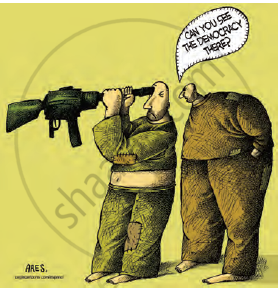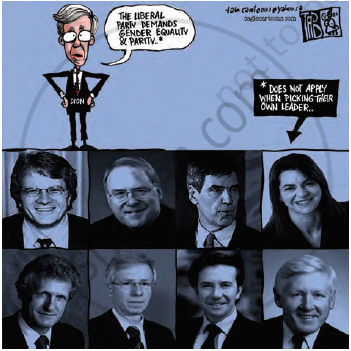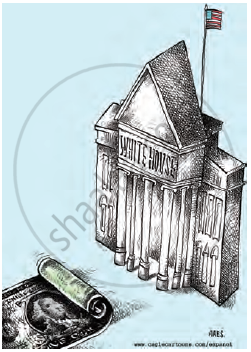Advertisements
Advertisements
प्रश्न
"Most of the established democracies are facing the challenge of expansion." Support the statement with examples.
उत्तर
Most of the established democracies face the challenge of expansion as it involves applying the principle of democratic government across all regions. This is due to the following reasons.
(a) Expansion of democracy is the logical next step to the foundational challenge and ensures safeguarding of democratic principles at grassroots level.
(b) Expansion of democracy is related to the empowerment of previously disadvantaged groups.
(c) It is related to the participation of people in the decision-making process so that the benefits accrue to all sections of society.
APPEARS IN
संबंधित प्रश्न
“A challenge is an opportunity for progress”. Support the statement with your arguments
This cartoon represents a challenge to democracy. Please describe what that challenge is. Also place it in one of the three categories mentioned below.
- foundational challenge to democracy
- challenge of expansion of democracy
- challenge of deepening of democracy

This cartoon represents a challenge to democracy. Please describe what that challenge is. Also place it in one of the three categories mentioned below.
- foundational challenge to democracy
- challenge of expansion of democracy
- challenge of deepening of democracy

This cartoon represents a challenge to democracy. Please describe what that challenge is. Also place it in one of the three categories mentioned below.
- foundational challenge to democracy
- challenge of expansion of democracy
- challenge of deepening of democracy

This cartoon represents a challenge to democracy. Please describe what that challenge is. Also place it in one of the three categories mentioned below.
- foundational challenge to democracy
- challenge of expansion of democracy
- challenge of deepening of democracy

Write a description of the challenges for democracy in the following situations.
|
Case and Context
|
Your description of the challenges for democracy in that situation |
|
Chile: General Pinochet's government was defeated, but military was still in control of many institutions. |
|
|
Poland: After the first success of solidarity, the government imposed martial law and banned solidarity. |
|
|
Ghana: Just attained independence, Nkrumah elected the President.
|
|
|
Mynamar: Suu Kyi under house arrest for more than 15 years, army rulers getting global acceptance.
|
|
|
International Organisations: US as the only superpower disregards the UN and takes unilateral action. |
|
|
Mexico: Second free election after the defeat of PRI in 2000; defeated candidates alleges rigging. |
|
|
China: The Communist party adopts economic reforms but maintains a monopoly over political power. |
|
|
Pakistan: General Musharraf holds referendum, allegations of fraud in the voter's list. |
|
|
Iraq: Widespread sectarian violence as the new government fails to establish its authority. |
|
|
South Africa: Mandela retires from active politics; pressure on his successor Mbeki to withdraw some concessions given to the white minority. |
|
|
US, Guantanamo Bay: UN Secretary General calls this a violation of international law; US refused to respond. |
|
|
Saudi Arabia: Women were not allowed to take part in public activities, no freedom of religion for the minority. |
|
|
Yugoslavia: Ethnic tension between Serbs and Albanians on the rise in the province of Kosovo; Yugoslavia disintegrated. |
|
|
Belgium: One round of constitutional change taken place, but the Dutch speakers not satisfied; they want more autonomy. |
|
|
Sri Lanka: Peace talks between the government and LTTE breaks down, renewed violence. |
|
|
US, Civil Rights: Blacks have won equal rights, but they are still poor, less educated and marginalised. |
|
|
Northern Ireland: The civil war has ended but Catholics and Protestants yet to develop trust. |
|
|
Nepal: Constituent Assembly about to be elected; unrest in Taraiareas; Maoists have not surrendered arms. |
|
|
Bolivia: Morales, a supporter of water struggle, becomes the Prime Minister, MNC's threaten to leave the country. |
Given below are some spheres or sites of democratic politics. You may place against each of these the specific challenges that you noted for one or more countries or cartoons in the previous section. In addition to that write one item for India for each of these spheres. In case you find that some challenges do not fit into any of the categories given below, you can create new categories and put some items under that.
|
Constitutional design |
|
|
Democratic rights |
|
|
Working of institutions |
|
|
Elections |
|
|
Federalism, decentralization |
|
|
Accommodation of diversity |
|
|
Political Organisation |
|
|
Religious and equality |
Let us group these again, this time by the nature of these challenges as per the classification suggested in the first section. For each of these categories, find at least one example from India as well.
|
Foundational Challenge |
|
|
Challenge of Expansion |
|
|
Challenge of deepening |
Now let us think only about India. Think of all the challenges that democracy faces in contemporary India. List those five that should be addressed first of all. The listing should be in order of priority, i.e, the challenge you find most important or pressing should be mentioned at number 1, and so on. Give one example of that challenge and your reasons for assigning it the priority.
| Priority |
Challenges to democracy |
Example |
Reasons for Preference |
| 1 | |||
| 2 | |||
| 3 | |||
| 4 | |||
| 5 |
Write a description of the challenges for democracy in the following situations.
|
Case and Context
|
Your description of the challenges for democracy in that situation |
|
Mexico: Second free election after the defeat of PRI in 2000; defeated candidates alleges rigging. |
|
|
China: The Communist party adopts economic reforms but maintains a monopoly over political power. |
|
|
Pakistan: General Musharraf holds referendum, allegations of fraud in the voter's list. |
|
|
Iraq: Widespread sectarian violence as the new government fails to establish its authority. |
|
|
South Africa: Mandela retires from active politics; pressure on his successor Mbeki to withdraw some concessions given to the white minority. |
|
|
US, Guantanamo Bay: UN Secretary General calls this a violation of international law; US refused to respond. |
|
|
Saudi Arabia: Women were not allowed to take part in public activities, no freedom of religion for the minority. |
|
|
Yugoslavia: Ethnic tension between Serbs and Albanians on the rise in the province of Kosovo; Yugoslavia disintegrated. |
|
|
Belgium: One round of constitutional change taken place, but the Dutch speakers not satisfied; they want more autonomy. |
|
|
Sri Lanka: Peace talks between the government and LTTE breaks down, renewed violence. |
|
|
US, Civil Rights: Blacks have won equal rights, but they are still poor, less educated and marginalised. |
|
|
Northern Ireland: The civil war has ended but Catholics and Protestants yet to develop trust. |
|
|
Nepal: Constituent Assembly about to be elected; unrest in Taraiareas; Maoists have not surrendered arms. |
|
|
Bolivia: Morales, a supporter of water struggle, becomes the Prime Minister, MNC's threaten to leave the country. |
